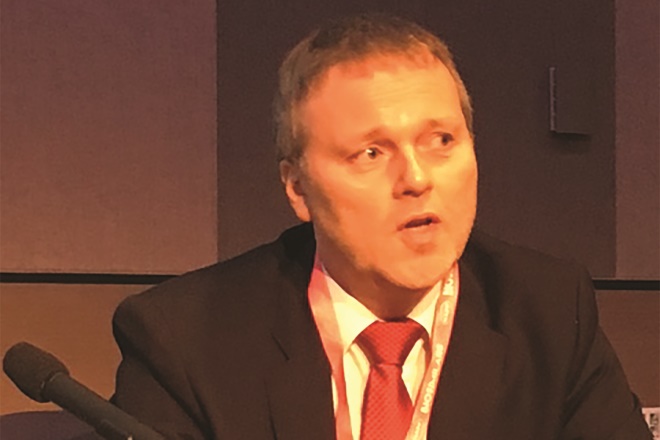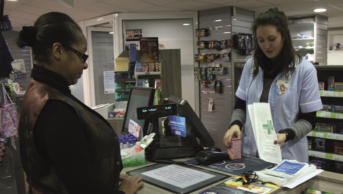
alamy.com
The Royal Pharmaceutical Society (RPS) has said it believes a pharmacist should always be present in a pharmacy, apart from occasional short periods of time.
Responding to a leaked document produced for the Department of Health (DH) on the issue of whether pharmacy technicians should be allowed to supervise pharmacies, the RPS has issued an eight-point position statement on the role of registered technicians supervising the sale and supply of medicines.
The three RPS national boards have jointly called for legal guarantees that a pharmacist will always undertake a clinical assessment or check, and that there must be no legal loopholes that can bypass this requirement.
The RPS Welsh, Scottish and English board chairs and the RPS President are united in their views on this issue, according to an RPS statement issued with its position statement, which said: “The RPS has made it very clear that access to a pharmacist and their ability to provide clinical assurance for safety in community pharmacies is absolutely essential.
“We do not want to see pharmacies run without pharmacists.”
The leaked document, prepared by a working group of the DH’s Rebalancing Medicines Legislation and Pharmacy Regulation Programme Board, suggested that current legislation could be changed to allow a “registered pharmacy professional”, which could include a technician, to “take responsibility for” the sale and supply of pharmacy and prescription-only medicines.
The Short Life Working Group on Supervision was co-chaired by Keith Ridge, chief pharmaceutical officer for England, and his Scottish counterpart, Rose Marie Parr.
Minutes from a Rebalancing Board meeting on 7 April 2016, where the proposals were presented, recorded that they were “discussed by the Board, which was generally supportive, in principle, of the direction of thinking”.
According to the Rebalancing Board’s website, current members include Ash Soni, RPS president, and Paul Bennett, RPS chief executive, although neither were on the board in April 2016.
However, minutes from a subsequent Rebalancing Board meeting on 12 October 2016 refer to a letter sent from the chairs of the three national RPS boards to the chair of the Rebalancing Board on this topic: “In the discussion, some members indicated they did not agree certain aspects of the emerging proposals to enable all registered and competent pharmacy professionals to supervise the sale and supply of medicines. Maintaining and improving patient safety was important, as was improving patient care, including through developing the opportunity for pharmacy professionals to use their clinical skills.”
An RPS spokesperson said: “We would expect a single pharmacist to have responsibility for a single pharmacy as they do now.
“We want to see greater investment and job security for pharmacists in community pharmacy, enabling them to build their services for patients and the public.”
The position statement goes on to say: “The new roles and responsibilities of the Responsible Pharmacist and Superintendent Pharmacists need to be defined as a prerequisite before exploring any changes to the role of technicians. We have urged the Rebalancing Board to prioritise this area of work.
“We would want to see the law constructed so as to ensure the pharmacist always has the opportunity to undertake the clinical assessment or check, and that any new law does not have gaps where this could potentially be bypassed.
“We would not like to see legislation that, in the future, could be used to operate pharmacies without pharmacists being present for anything other than very short periods of time.
And it adds: “Many within the profession have expressed that their only frustration is a direct result of the present legislation that bagged up prescriptions cannot be handed out when the pharmacist is temporarily absent.
“Future legislation should look to resolve this without causing unintended consequences to patient safety or the pharmacy network.”
Other bodies have responded strongly to the leaked document on technician supervision.

Source: Royal Pharmaceutical Society
Chair of the Pharmacists’ Defence Association, Mark Koziol, said that the PDA believed it was inconceivable that a pharmacy would be operated in the best interest of patient safety without a pharmacist. He added that the PDA had not been approached about this suggestion, nor had there been a wider stakeholder group meeting for several years
Mark Koziol, chair of the Pharmacists’ Defence Association (PDA), said: “We firmly believe that it is inconceivable that a pharmacy without a pharmacist present would ever be able to safely meet the needs of patients. The PDA is a member of a wider stakeholder group with whom the Department of Health and its Rebalancing Committee are required to discuss any such proposals. We can confirm that we have not been approached about this suggestion, nor has there been a wider stakeholder group meeting for several years.
“We believe that any individual or organisation purporting to represent pharmacists on the Rebalancing Committee that has been aware of such proposals and that did not oppose them when they surfaced at the meetings, should outline their reasons.”
In a statement, the General Pharmaceutical Council (GPhC) said: “Any decision about changes to the law regarding supervision are a matter for the government and would require a public consultation on any proposals. In the event that any proposals on supervision were brought forward by the government for consultation, our Council would respond to the consultation after considering the proposals in detail.”
Tess Fenn, president of the Association of Pharmacy Technicians UK (APTUK) said: “The GPhC professional standards, that apply in full to both pharmacy technicians and pharmacists, indicate that registrants should ‘delegate tasks only to people who are competent and appropriately trained or are in training, and exercise proper oversight’. This is of upmost importance for patient safety. Any governmental changes to legislation will require a public consultation and APTUK will engage with pharmacy technicians to ensure that our profession’s views are sought and fully represented.”
A DH spokesperson said: “We want to make the best use of every member of staff’s skills in pharmacies. Any changes made to who can dispense medicines would always be properly consulted on and would never compromise the safety of patients.”
In August, health secretary Jeremy Hunt confirmed in a letter to Leeds Labour MP Hilary Benn that there were currently no plans to give pharmacy technicians the power to supervise a community pharmacy.
- 22 September 2017: This article was amended to clarify that the three RPS national boards and the RPS President are united in their views on supervision and that neither the sitting president nor the current chief executive were on the Rebalancing Board in April 2016.


